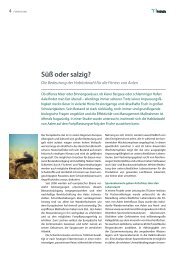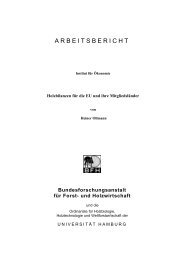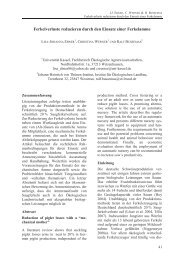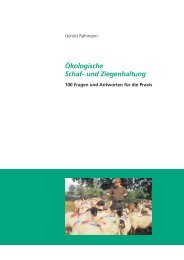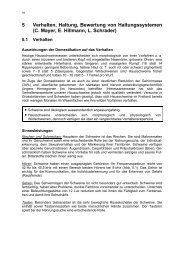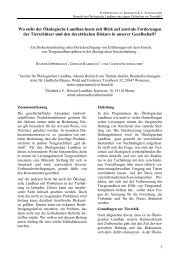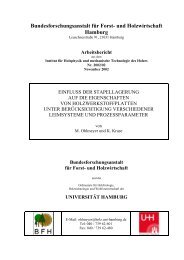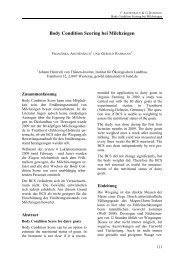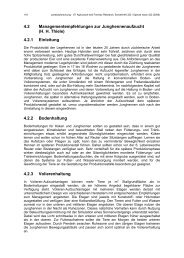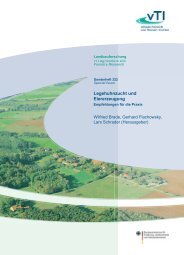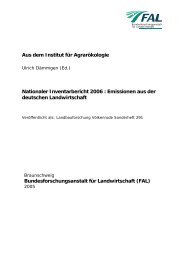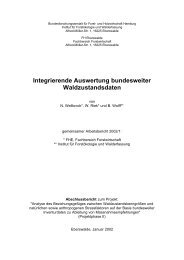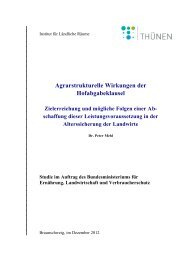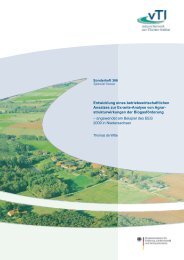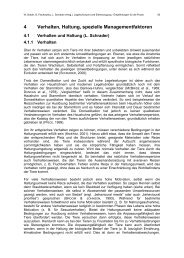- Page 1 and 2:
Sonderheft 362 Special Issue Tackli
- Page 3:
Landbauforschung vTI Agriculture an
- Page 7 and 8:
Foreword Organic animal husbandry s
- Page 9 and 10:
RAHMANN G & GODINHO D (Ed.) (2012):
- Page 11 and 12:
Content RAHMANN G & GODINHO D (Ed.)
- Page 13 and 14:
RAHMANN G & GODINHO D (Ed.) (2012):
- Page 15 and 16:
RAHMANN G & GODINHO D (Ed.) (2012):
- Page 17 and 18:
RAHMANN G & GODINHO D (Ed.) (2012):
- Page 19 and 20:
RAHMANN G & GODINHO D (Ed.) (2012):
- Page 21 and 22:
Introduction RAHMANN G & GODINHO D
- Page 23 and 24:
RAHMANN G & GODINHO D (Ed.) (2012):
- Page 25 and 26:
RAHMANN G & GODINHO D (Ed.) (2012):
- Page 27 and 28:
RAHMANN G & GODINHO D (Ed.) (2012):
- Page 29 and 30:
RAHMANN G & GODINHO D (Ed.) (2012):
- Page 31 and 32:
RAHMANN G & GODINHO D (Ed.) (2012):
- Page 33 and 34:
RAHMANN G & GODINHO D (Ed.) (2012):
- Page 35 and 36:
References RAHMANN G & GODINHO D (E
- Page 37 and 38:
RAHMANN G & GODINHO D (Ed.) (2012):
- Page 39 and 40:
RAHMANN G & GODINHO D (Ed.) (2012):
- Page 41 and 42:
RAHMANN G & GODINHO D (Ed.) (2012):
- Page 43 and 44:
RAHMANN G & GODINHO D (Ed.) (2012):
- Page 45 and 46:
RAHMANN G & GODINHO D (Ed.) (2012):
- Page 47 and 48:
RAHMANN G & GODINHO D (Ed.) (2012):
- Page 49 and 50:
Abstract RAHMANN G & GODINHO D (Ed.
- Page 51 and 52:
RAHMANN G & GODINHO D (Ed.) (2012):
- Page 53 and 54:
RAHMANN G & GODINHO D (Ed.) (2012):
- Page 55 and 56:
RAHMANN G & GODINHO D (Ed.) (2012):
- Page 57 and 58:
Abstract RAHMANN G & GODINHO D (Ed.
- Page 59 and 60:
RAHMANN G & GODINHO D (Ed.) (2012):
- Page 61 and 62:
RAHMANN G & GODINHO D (Ed.) (2012):
- Page 63 and 64:
RAHMANN G & GODINHO D (Ed.) (2012):
- Page 65 and 66:
Abstract RAHMANN G & GODINHO D (Ed.
- Page 67 and 68:
Discussion RAHMANN G & GODINHO D (E
- Page 69 and 70:
RAHMANN G & GODINHO D (Ed.) (2012):
- Page 71 and 72:
RAHMANN G & GODINHO D (Ed.) (2012):
- Page 73 and 74:
RAHMANN G & GODINHO D (Ed.) (2012):
- Page 75 and 76:
RAHMANN G & GODINHO D (Ed.) (2012):
- Page 77 and 78:
RAHMANN G & GODINHO D (Ed.) (2012):
- Page 79 and 80:
RAHMANN G & GODINHO D (Ed.) (2012):
- Page 81 and 82:
Abstract RAHMANN G & GODINHO D (Ed.
- Page 83 and 84:
RAHMANN G & GODINHO D (Ed.) (2012):
- Page 85 and 86: RAHMANN G & GODINHO D (Ed.) (2012):
- Page 87 and 88: RAHMANN G & GODINHO D (Ed.) (2012):
- Page 89 and 90: RAHMANN G & GODINHO D (Ed.) (2012):
- Page 91 and 92: Factors Plant Height (cm) RAHMANN G
- Page 93 and 94: References RAHMANN G & GODINHO D (E
- Page 95 and 96: RAHMANN G & GODINHO D (Ed.) (2012):
- Page 97 and 98: RAHMANN G & GODINHO D (Ed.) (2012):
- Page 99 and 100: RAHMANN G & GODINHO D (Ed.) (2012):
- Page 101 and 102: RAHMANN G & GODINHO D (Ed.) (2012):
- Page 103 and 104: RAHMANN G & GODINHO D (Ed.) (2012):
- Page 105 and 106: Discussion RAHMANN G & GODINHO D (E
- Page 107 and 108: RAHMANN G & GODINHO D (Ed.) (2012):
- Page 109 and 110: Introduction RAHMANN G & GODINHO D
- Page 111 and 112: RAHMANN G & GODINHO D (Ed.) (2012):
- Page 113 and 114: Introduction RAHMANN G & GODINHO D
- Page 115 and 116: RAHMANN G & GODINHO D (Ed.) (2012):
- Page 117 and 118: RAHMANN G & GODINHO D (Ed.) (2012):
- Page 119 and 120: RAHMANN G & GODINHO D (Ed.) (2012):
- Page 121 and 122: RAHMANN G & GODINHO D (Ed.) (2012):
- Page 123 and 124: Abstract RAHMANN G & GODINHO D (Ed.
- Page 125 and 126: RAHMANN G & GODINHO D (Ed.) (2012):
- Page 127 and 128: Abstract RAHMANN G & GODINHO D (Ed.
- Page 129 and 130: Discussion RAHMANN G & GODINHO D (E
- Page 131 and 132: RAHMANN G & GODINHO D (Ed.) (2012):
- Page 133 and 134: RAHMANN G & GODINHO D (Ed.) (2012):
- Page 135: Abstract RAHMANN G & GODINHO D (Ed.
- Page 139 and 140: Abstract RAHMANN G & GODINHO D (Ed.
- Page 141 and 142: RAHMANN G & GODINHO D (Ed.) (2012):
- Page 143 and 144: Abstract RAHMANN G & GODINHO D (Ed.
- Page 145 and 146: RAHMANN G & GODINHO D (Ed.) (2012):
- Page 147 and 148: RAHMANN G & GODINHO D (Ed.) (2012):
- Page 149 and 150: RAHMANN G & GODINHO D (Ed.) (2012):
- Page 151 and 152: RAHMANN G & GODINHO D (Ed.) (2012):
- Page 153 and 154: RAHMANN G & GODINHO D (Ed.) (2012):
- Page 155 and 156: RAHMANN G & GODINHO D (Ed.) (2012):
- Page 157 and 158: RAHMANN G & GODINHO D (Ed.) (2012):
- Page 159 and 160: Abstract RAHMANN G & GODINHO D (Ed.
- Page 161 and 162: RAHMANN G & GODINHO D (Ed.) (2012):
- Page 163 and 164: RAHMANN G & GODINHO D (Ed.) (2012):
- Page 165 and 166: RAHMANN G & GODINHO D (Ed.) (2012):
- Page 167 and 168: RAHMANN G & GODINHO D (Ed.) (2012):
- Page 169 and 170: RAHMANN G & GODINHO D (Ed.) (2012):
- Page 171 and 172: RAHMANN G & GODINHO D (Ed.) (2012):
- Page 173 and 174: References RAHMANN G & GODINHO D (E
- Page 175 and 176: Abstract RAHMANN G & GODINHO D (Ed.
- Page 177 and 178: RAHMANN G & GODINHO D (Ed.) (2012):
- Page 179 and 180: Abstract RAHMANN G & GODINHO D (Ed.
- Page 181 and 182: RAHMANN G & GODINHO D (Ed.) (2012):
- Page 183 and 184: RAHMANN G & GODINHO D (Ed.) (2012):
- Page 185 and 186: RAHMANN G & GODINHO D (Ed.) (2012):
- Page 187 and 188:
Abstract RAHMANN G & GODINHO D (Ed.
- Page 189 and 190:
RAHMANN G & GODINHO D (Ed.) (2012):
- Page 191 and 192:
RAHMANN G & GODINHO D (Ed.) (2012):
- Page 193 and 194:
RAHMANN G & GODINHO D (Ed.) (2012):
- Page 195 and 196:
RAHMANN G & GODINHO D (Ed.) (2012):
- Page 197 and 198:
Abstract RAHMANN G & GODINHO D (Ed.
- Page 199 and 200:
RAHMANN G & GODINHO D (Ed.) (2012):
- Page 201 and 202:
Abstract RAHMANN G & GODINHO D (Ed.
- Page 203 and 204:
RAHMANN G & GODINHO D (Ed.) (2012):
- Page 205 and 206:
RAHMANN G & GODINHO D (Ed.) (2012):
- Page 207 and 208:
RAHMANN G & GODINHO D (Ed.) (2012):
- Page 209 and 210:
RAHMANN G & GODINHO D (Ed.) (2012):
- Page 211 and 212:
RAHMANN G & GODINHO D (Ed.) (2012):
- Page 213 and 214:
Abstract RAHMANN G & GODINHO D (Ed.
- Page 215 and 216:
RAHMANN G & GODINHO D (Ed.) (2012):
- Page 217 and 218:
Abstract RAHMANN G & GODINHO D (Ed.
- Page 219 and 220:
RAHMANN G & GODINHO D (Ed.) (2012):
- Page 221 and 222:
RAHMANN G & GODINHO D (Ed.) (2012):
- Page 223 and 224:
RAHMANN G & GODINHO D (Ed.) (2012):
- Page 225 and 226:
RAHMANN G & GODINHO D (Ed.) (2012):
- Page 227 and 228:
RAHMANN G & GODINHO D (Ed.) (2012):
- Page 229 and 230:
RAHMANN G & GODINHO D (Ed.) (2012):
- Page 231 and 232:
RAHMANN G & GODINHO D (Ed.) (2012):
- Page 233 and 234:
Results RAHMANN G & GODINHO D (Ed.)
- Page 235 and 236:
RAHMANN G & GODINHO D (Ed.) (2012):
- Page 237 and 238:
RAHMANN G & GODINHO D (Ed.) (2012):
- Page 239 and 240:
RAHMANN G & GODINHO D (Ed.) (2012):
- Page 241 and 242:
RAHMANN G & GODINHO D (Ed.) (2012):
- Page 243 and 244:
Abstract RAHMANN G & GODINHO D (Ed.
- Page 245 and 246:
RAHMANN G & GODINHO D (Ed.) (2012):
- Page 247 and 248:
Abstract RAHMANN G & GODINHO D (Ed.
- Page 249 and 250:
FEC adjusted for dry matter 12000 1
- Page 251 and 252:
RAHMANN G & GODINHO D (Ed.) (2012):
- Page 253 and 254:
Abstract RAHMANN G & GODINHO D (Ed.
- Page 255 and 256:
RAHMANN G & GODINHO D (Ed.) (2012):
- Page 257 and 258:
RAHMANN G & GODINHO D (Ed.) (2012):
- Page 259 and 260:
RAHMANN G & GODINHO D (Ed.) (2012):
- Page 261 and 262:
RAHMANN G & GODINHO D (Ed.) (2012):
- Page 263 and 264:
RAHMANN G & GODINHO D (Ed.) (2012):
- Page 265 and 266:
RAHMANN G & GODINHO D (Ed.) (2012):
- Page 267 and 268:
Conclusions RAHMANN G & GODINHO D (
- Page 269 and 270:
RAHMANN G & GODINHO D (Ed.) (2012):
- Page 271 and 272:
RAHMANN G & GODINHO D (Ed.) (2012):
- Page 273 and 274:
RAHMANN G & GODINHO D (Ed.) (2012):
- Page 275 and 276:
RAHMANN G & GODINHO D (Ed.) (2012):
- Page 277 and 278:
Results RAHMANN G & GODINHO D (Ed.)
- Page 279 and 280:
RAHMANN G & GODINHO D (Ed.) (2012):
- Page 281 and 282:
RAHMANN G & GODINHO D (Ed.) (2012):
- Page 283 and 284:
RAHMANN G & GODINHO D (Ed.) (2012):
- Page 285 and 286:
RAHMANN G & GODINHO D (Ed.) (2012):
- Page 287 and 288:
RAHMANN G & GODINHO D (Ed.) (2012):
- Page 289 and 290:
RAHMANN G & GODINHO D (Ed.) (2012):
- Page 291 and 292:
Abstract RAHMANN G & GODINHO D (Ed.
- Page 293 and 294:
RAHMANN G & GODINHO D (Ed.) (2012):
- Page 295 and 296:
RAHMANN G & GODINHO D (Ed.) (2012):
- Page 297 and 298:
RAHMANN G & GODINHO D (Ed.) (2012):
- Page 299 and 300:
RAHMANN G & GODINHO D (Ed.) (2012):
- Page 301 and 302:
RAHMANN G & GODINHO D (Ed.) (2012):
- Page 303 and 304:
RAHMANN G & GODINHO D (Ed.) (2012):
- Page 305 and 306:
Abstract RAHMANN G & GODINHO D (Ed.
- Page 307 and 308:
RAHMANN G & GODINHO D (Ed.) (2012):
- Page 309 and 310:
RAHMANN G & GODINHO D (Ed.) (2012):
- Page 311 and 312:
RAHMANN G & GODINHO D (Ed.) (2012):
- Page 313 and 314:
RAHMANN G & GODINHO D (Ed.) (2012):
- Page 315 and 316:
RAHMANN G & GODINHO D (Ed.) (2012):
- Page 317 and 318:
RAHMANN G & GODINHO D (Ed.) (2012):
- Page 319 and 320:
RAHMANN G & GODINHO D (Ed.) (2012):
- Page 321 and 322:
RAHMANN G & GODINHO D (Ed.) (2012):
- Page 323 and 324:
RAHMANN G & GODINHO D (Ed.) (2012):
- Page 325 and 326:
RAHMANN G & GODINHO D (Ed.) (2012):
- Page 327 and 328:
Abstract RAHMANN G & GODINHO D (Ed.
- Page 329 and 330:
RAHMANN G & GODINHO D (Ed.) (2012):
- Page 331 and 332:
RAHMANN G & GODINHO D (Ed.) (2012):
- Page 333 and 334:
RAHMANN G & GODINHO D (Ed.) (2012):
- Page 335 and 336:
RAHMANN G & GODINHO D (Ed.) (2012):
- Page 337 and 338:
RAHMANN G & GODINHO D (Ed.) (2012):
- Page 339 and 340:
RAHMANN G & GODINHO D (Ed.) (2012):
- Page 341 and 342:
RAHMANN G & GODINHO D (Ed.) (2012):
- Page 343 and 344:
RAHMANN G & GODINHO D (Ed.) (2012):
- Page 345 and 346:
RAHMANN G & GODINHO D (Ed.) (2012):
- Page 347 and 348:
RAHMANN G & GODINHO D (Ed.) (2012):
- Page 349 and 350:
RAHMANN G & GODINHO D (Ed.) (2012):
- Page 351 and 352:
RAHMANN G & GODINHO D (Ed.) (2012):
- Page 353 and 354:
Introduction RAHMANN G & GODINHO D
- Page 355 and 356:
349 Table 1. Breeding information o
- Page 357 and 358:
RAHMANN G & GODINHO D (Ed.) (2012):
- Page 359 and 360:
RAHMANN G & GODINHO D (Ed.) (2012):
- Page 361 and 362:
Abstract RAHMANN G & GODINHO D (Ed.
- Page 363 and 364:
RAHMANN G & GODINHO D (Ed.) (2012):
- Page 365 and 366:
RAHMANN G & GODINHO D (Ed.) (2012):
- Page 367 and 368:
RAHMANN G & GODINHO D (Ed.) (2012):
- Page 369 and 370:
RAHMANN G & GODINHO D (Ed.) (2012):
- Page 371 and 372:
Abstract RAHMANN G & GODINHO D (Ed.
- Page 373 and 374:
RAHMANN G & GODINHO D (Ed.) (2012):
- Page 375 and 376:
RAHMANN G & GODINHO D (Ed.) (2012):
- Page 377 and 378:
RAHMANN G & GODINHO D (Ed.) (2012):
- Page 379 and 380:
RAHMANN G & GODINHO D (Ed.) (2012):
- Page 381 and 382:
RAHMANN G & GODINHO D (Ed.) (2012):
- Page 383 and 384:
RAHMANN G & GODINHO D (Ed.) (2012):
- Page 385 and 386:
Abstract RAHMANN G & GODINHO D (Ed.
- Page 387 and 388:
RAHMANN G & GODINHO D (Ed.) (2012):
- Page 389 and 390:
Abstract RAHMANN G & GODINHO D (Ed.
- Page 391 and 392:
RAHMANN G & GODINHO D (Ed.) (2012):
- Page 393 and 394:
RAHMANN G & GODINHO D (Ed.) (2012):
- Page 395 and 396:
RAHMANN G & GODINHO D (Ed.) (2012):
- Page 397 and 398:
RAHMANN G & GODINHO D (Ed.) (2012):
- Page 399 and 400:
RAHMANN G & GODINHO D (Ed.) (2012):
- Page 401 and 402:
RAHMANN G & GODINHO D (Ed.) (2012):
- Page 403 and 404:
RAHMANN G & GODINHO D (Ed.) (2012):
- Page 405 and 406:
RAHMANN G & GODINHO D (Ed.) (2012):
- Page 407 and 408:
Abstract RAHMANN G & GODINHO D (Ed.
- Page 409 and 410:
RAHMANN G & GODINHO D (Ed.) (2012):
- Page 411 and 412:
RAHMANN G & GODINHO D (Ed.) (2012):
- Page 413 and 414:
Abstract RAHMANN G & GODINHO D (Ed.
- Page 415 and 416:
RAHMANN G & GODINHO D (Ed.) (2012):
- Page 417 and 418:
RAHMANN G & GODINHO D (Ed.) (2012):
- Page 419 and 420:
RAHMANN G & GODINHO D (Ed.) (2012):
- Page 421 and 422:
RAHMANN G & GODINHO D (Ed.) (2012):
- Page 423 and 424:
RAHMANN G & GODINHO D (Ed.) (2012):
- Page 425 and 426:
RAHMANN G & GODINHO D (Ed.) (2012):
- Page 427 and 428:
RAHMANN G & GODINHO D (Ed.) (2012):
- Page 429 and 430:
RAHMANN G & GODINHO D (Ed.) (2012):
- Page 431 and 432:
RAHMANN G & GODINHO D (Ed.) (2012):
- Page 433 and 434:
RAHMANN G & GODINHO D (Ed.) (2012):
- Page 435 and 436:
RAHMANN G & GODINHO D (Ed.) (2012):
- Page 437 and 438:
RAHMANN G & GODINHO D (Ed.) (2012):
- Page 439 and 440:
RAHMANN G & GODINHO D (Ed.) (2012):
- Page 441 and 442:
RAHMANN G & GODINHO D (Ed.) (2012):
- Page 443 and 444:
Abstract RAHMANN G & GODINHO D (Ed.
- Page 445 and 446:
Kg liveweight (mean) RAHMANN G & GO
- Page 447 and 448:
Abstract RAHMANN G & GODINHO D (Ed.
- Page 449 and 450:
RAHMANN G & GODINHO D (Ed.) (2012):
- Page 451 and 452:
RAHMANN G & GODINHO D (Ed.) (2012):
- Page 453 and 454:
Results RAHMANN G & GODINHO D (Ed.)
- Page 455 and 456:
RAHMANN G & GODINHO D (Ed.) (2012):
- Page 457 and 458:
RAHMANN G & GODINHO D (Ed.) (2012):
- Page 459 and 460:
RAHMANN G & GODINHO D (Ed.) (2012):
- Page 461 and 462:
RAHMANN G & GODINHO D (Ed.) (2012):
- Page 463 and 464:
RAHMANN G & GODINHO D (Ed.) (2012):
- Page 465 and 466:
RAHMANN G & GODINHO D (Ed.) (2012):
- Page 467 and 468:
References RAHMANN G & GODINHO D (E
- Page 469 and 470:
RAHMANN G & GODINHO D (Ed.) (2012):
- Page 471 and 472:
RAHMANN G & GODINHO D (Ed.) (2012):
- Page 473 and 474:
RAHMANN G & GODINHO D (Ed.) (2012):
- Page 475 and 476:
RAHMANN G & GODINHO D (Ed.) (2012):
- Page 477 and 478:
RAHMANN G & GODINHO D (Ed.) (2012):
- Page 479 and 480:
RAHMANN G & GODINHO D (Ed.) (2012):
- Page 481 and 482:
RAHMANN G & GODINHO D (Ed.) (2012):
- Page 483 and 484:
RAHMANN G & GODINHO D (Ed.) (2012):
- Page 485 and 486:
RAHMANN G & GODINHO D (Ed.) (2012):
- Page 487 and 488:
RAHMANN G & GODINHO D (Ed.) (2012):
- Page 489:
348 Herwart Böhm (Hrsg.) (2011) Op



